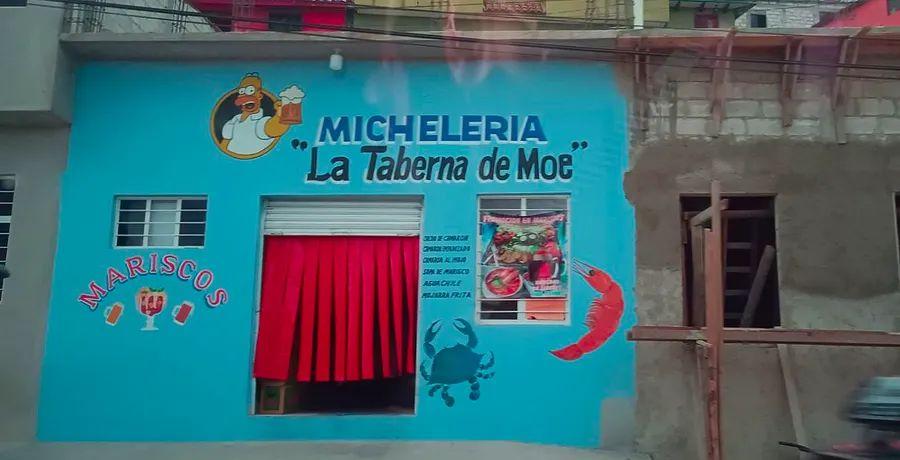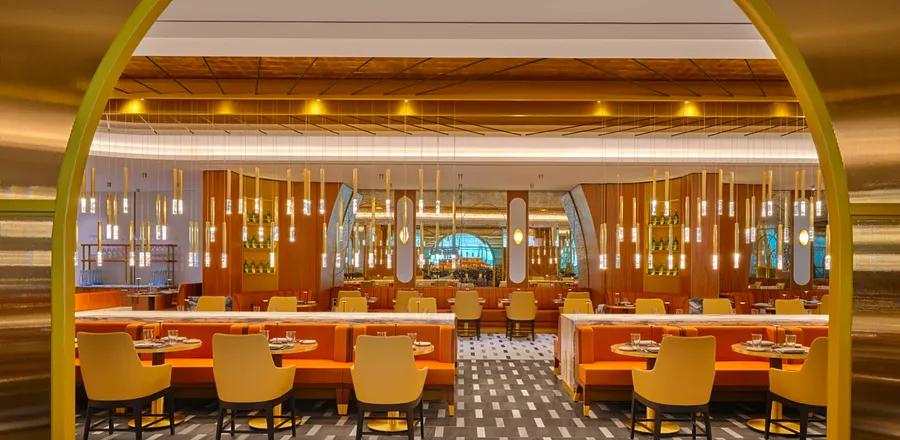The Phenomenon of Bootleg Moe’s Taverns Across Latin America


On the outskirts of Cuenca, Ecuador, bar hoppers might inadvertently step from the Andes into Los Simpson. On one side of the street, Springfield’s name gleams above whimsical murals depicting Chief Wiggum apprehending Bart, Kearney, and Dolph for their antics. Across the road, the facade of Springfield Elementary School looms over two small buildings: “Krosty Burger” and La Taberna de Mou. Inside the latter, patrons are welcomed by a life-size cutout of Moe Szyslak, complete with the phone Bart often uses for prank calls. There’s a full-size Love Tester machine, themed artwork adorning the walls, and barrels of Duff beer, available both by can and on tap.
This isn’t the only spirited homage to the show in Latin America—or even in Ecuador. From northern Mexico to Argentina, countless bars bear Moe’s name, often called Taberna de Moe or Mou. Numerous examples exist across Mexico: Moe’s in La Piedad de Cavadas, Moe’s Beer in Coyoacán, Mexico City (featuring melting Homer-Dali inspired decor), San Luis Potosí, Hidalgo, Guadalajara, Guanajuato. In Central America, Tabernas de Moe can be found in El Salvador, Honduras, Guatemala, Nicaragua, and Costa Rica, extending further south to Colombia, Brazil, Argentina, Paraguay, Chile, and Peru. Many mimic Springfield’s dingiest bar and serve character-themed cocktails alongside Duff beer. While they may not be officially sanctioned and likely lack Disney's consent (which owns 21st Century Fox, hence The Simpsons), that doesn’t diminish their charm for fans.
Los Simpson enjoys immense popularity throughout Latin America. It’s the most successful imported TV series in Mexico, producing the dubbed version favored in Spanish-speaking countries. It has helped popularize terms like pendejo and chavo in places like Colombia, and a neighborhood in Mexico City, Iztacalco, is even nicknamed “Sprayfield” for its vibrant Simpsons murals.
According to Michell Alvarez and Magaly Lopez, the owners of La Taberna de Moe in San José Pinula, Guatemala, The Simpsons holds such popularity that they believe “not a single person” from their generation has missed it. The duo aspired to open a bar named after Szyslak since childhood, considering him “the best bartender in history,” finally achieving their dream in December 2020 after facing job losses during the COVID-19 pandemic. Though newly opened, their bar just west of Guatemala City has quickly drawn locals and Simpsons enthusiasts, and while there are no Simpsons-themed items on the menu, the walls showcase framed scenes from the show.
For those in Latin America, visiting one of these unlicensed bars is a far more affordable option than flying to California or Florida to experience the official Moe’s Tavern at Universal Studios. “For many, our bar is the only opportunity to immerse themselves in the Simpsons experience, as our patrons often can’t afford to visit the real Moe’s Tavern,” explains Nicolás González Milano. In 2017, he and a group of friends, each with varying degrees of Simpsons fandom, opened a Moe’s Tavern in the Ituzaingó district of Buenos Aires to cater to fans unable to travel internationally.
However, before Milano’s Tavern celebrated its first anniversary, Fox filed a copyright claim against the establishment: entities that hold valuable intellectual property rarely tolerate copyright infringement, regardless of fans’ intentions. Unauthorized Simpsons merchandise has been a common occurrence over the years, and the show itself has parodied this trend. While merch sellers can quickly move truckloads of bootleg T-shirts and vanish, Tabernas de Moe operating openly draw grMytour scrutiny from both enthusiasts and legal authorities. Two years later, Milano and his team relocated and rebranded as the less legally contentious Ribbon Bar (a nod to Moe’s bow tie). The new venue retains a Moe’s-inspired exterior, complete with a life-sized figure of Lyle Lanley, the nefarious monorail conman, peeking out from a repurposed train car.
It may seem ridiculous for a $284 billion corporation to target a small bar in the outskirts of Buenos Aires, but global giants like Disney have significant stakes in controlling bootleg operations. According to intellectual property law expert Estelle Derclaye from the University of Nottingham, these corporations are highly litigious and “very protective” of their intellectual property. Businesses fear “dilution,” as Derclaye points out, when trademark or copyright infringements undermine the original brand, regardless of the offender's size. Furthermore, corporations dread negative perceptions associated with their brand if patrons at an unlicensed venue experience issues like food poisoning.
Nevertheless, the struggle has not been one-sided. Some Latin American knockoffs have pressured the litigation-happy media company into finding common ground with fans. After battling bootleg versions of Duff in Colombia and Mexico, Fox began brewing the beer itself. A company representative remarked at the time, “Once you witness enough piracy, you are faced with two options: either fight it or enter the market.” To establish trademark rights, which typically do not apply to fictional products, the company had no choice but to produce Duff. With assistance from British brewer Paul Farnsworth, the company officially launched Duff in Chile, supplying Tabernas de Moe throughout the region. Currently, Milano mentions that supplies from the sole importer in Argentina have dried up, leaving him unable to procure enough of that wonderful Duff.
Still, it’s noteworthy that most Tabernas de Moe across Latin America appear to have avoided repercussions. Derclaye explains that pursuing legal action against fan-operated venues may not be the smartest move for corporations, as it could provoke consumer backlash.
The slightly unofficial nature of these tabernas adds to their allure. While entry to Universal Studios to visit the official, visually accurate Moe’s Tavern costs $109, that version is polished to reflect the sanitized image of The Simpsons as it stands in the far future — Season 3,000, or whatever number we’re on now. In contrast, the off-brand Tabernas de Moe capture the playful satire and scrappy anti-establishment spirit of the show’s beloved earlier seasons, themes that resonate deeply with many fans in Latin America.
Some fans align with Matt Groening’s progressive beliefs, sharing his pro-working-class stance and skepticism toward authority, while others see reflections of Homer’s quintessential blue-collar family. “The sometimes biting irony feels very Latin American, and self-criticism along with self-mockery resonates too,” notes Toby Miller, a cultural critic and professor at Universidad Autónoma Metropolitana. “Moreover, the emphasis on class is crucial, as seen in the popularity of the regional hit El Chavo del Ocho, which addressed similar themes.”
At the Taberna de Mou in Ecuador, next to Chief Wiggum holding a sign that reads “Wanted: El Barto,” a message in the classic Simpsons font proclaims “Un pedacito de Springfield en Cuenca” (a little piece of Springfield in Cuenca). It offers an affordable taste of the franchise, with cans of Duff costing just a few dollars while you snap photos at the bar, far cheaper than a flight to the U.S. Other snippets of the TV town can be found in Santa Tecla, El Salvador, with the San Salvador Volcano looming nearby, in La Serena, Chile amidst neocolonial buildings, and along the Pan-American Highway in southern Argentina. Although the life-sized cutouts might lack Disney's authorization and owners may need to rebrand from time to time, each Taberna de Moe embodies a slice of the spirit of Los Simpson that the glitzy theme park version can never replicate.
Tamlin Magee is a culture and technology writer hailing from London.

1

2

3

4

5
Evaluation :
5/5